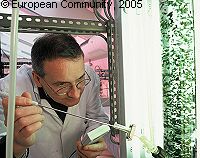Committee sets out criteria for selection of ERC governing council
The European Research Council (ERC) Identification Committee has laid down the main criteria for selecting future members of the body's governing council. The guidelines are published in the committee's interim report, which is available on the Commission's new European Basic Research website. The report covers the completed first stage of the Identification Committee's work, that of identifying the criteria to be used in the selection of governing council members, with the second stage being the selection process itself. Both stages involve close consultation with the main organisations representing the research community at European level. According to the report, the contributions received during the first stage of consultations 'were extremely constructive and indicated a strong convergence in views on the questions posed'. As a result, the committee intends to adopt six broad criteria as the basis of the selection criteria. First, it argues that the credibility of the governing council will be built on the qualities of scientific leadership, independence, wisdom and vision displayed by the men and women who make up its membership. These individuals should reflect the full breadth of the research community in Europe - including the social science and humanities - but should not consider themselves as representatives of a particular discipline. It adds that members of the council should have an undisputed reputation as research leaders. Generally, they should be current or recent research practitioners, and consideration should also be given to younger, next-generation research leaders. The governing council must cover a broad range of experience, for instance from universities, academies, funding bodies and industry, and include individuals with experience in more than one country, including some drawn from outside Europe. Last, the report notes: 'Avoiding conflicts of interest may require limits on the extent to which members of the governing council can concurrently hold other national or international institutional positions in research funding.' Moving forward, the Identification Committee will consult the same organisations that were contacted during the first phase of its work and ask them to suggest individuals who meet the expressed criteria and who are interested in performing the role. An annex to the report outlines the expected duties of the governing council and the time commitments that will be required of its members. Finally, the document provides details of the timetable for future activities, with evaluation of candidates expected to begin in May, and the committee's final report being published sometime in June. The report is published on the Commission's newly launched European Basic Research website, where users can follow all major developments related to EU support for fundamental research.



